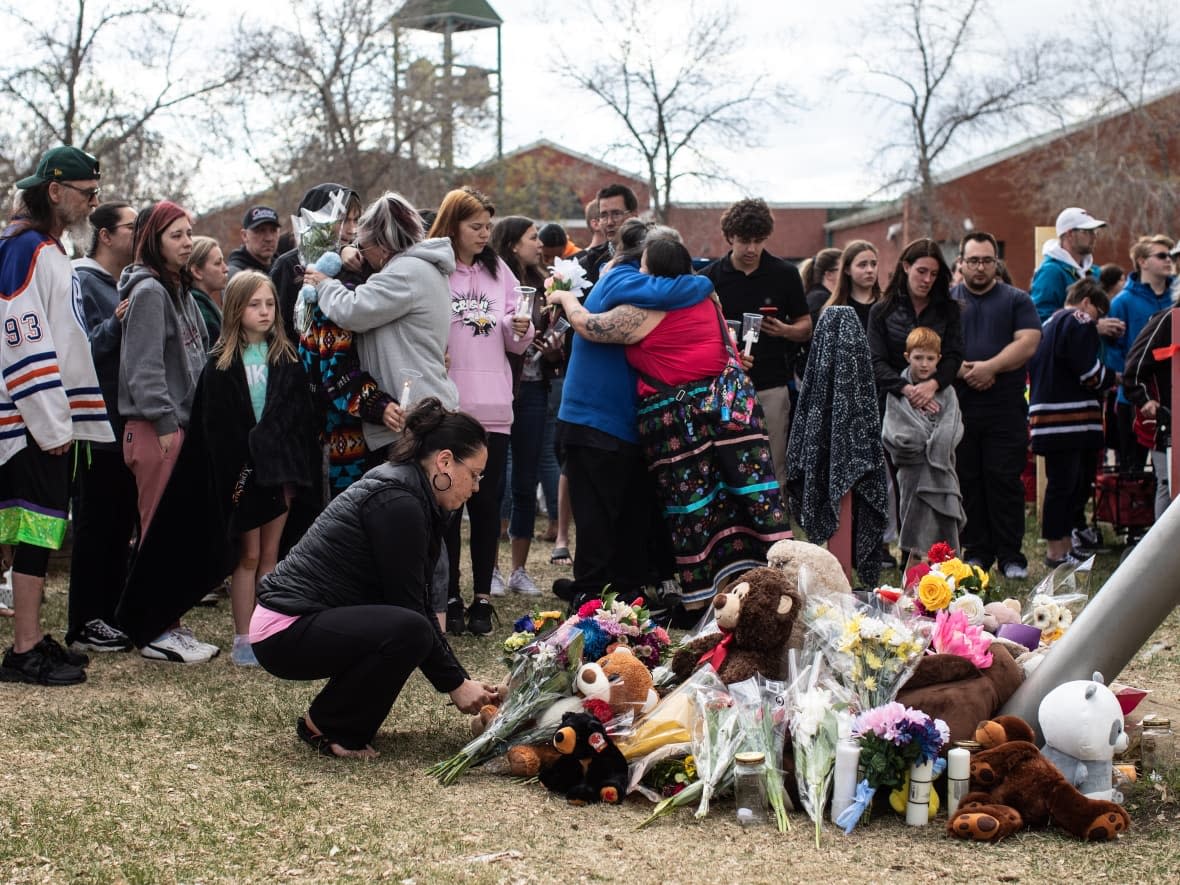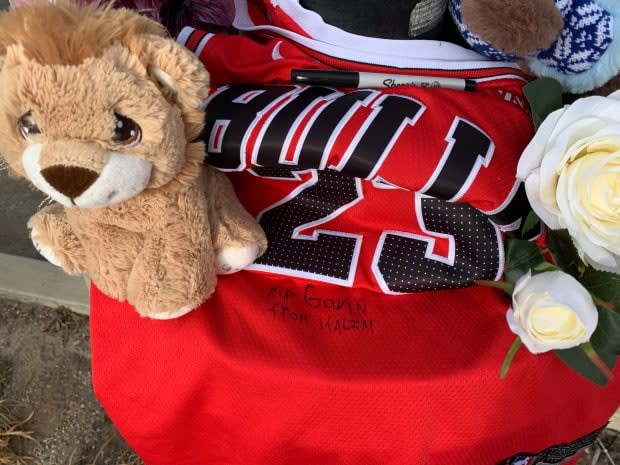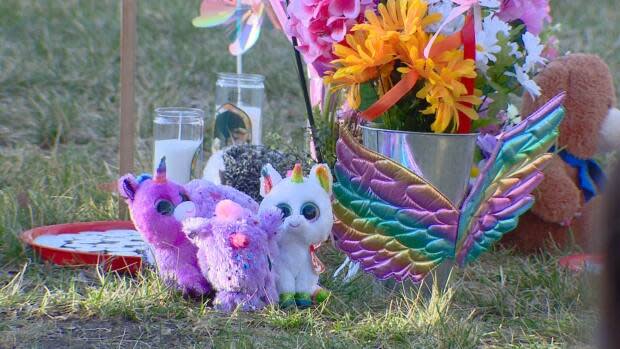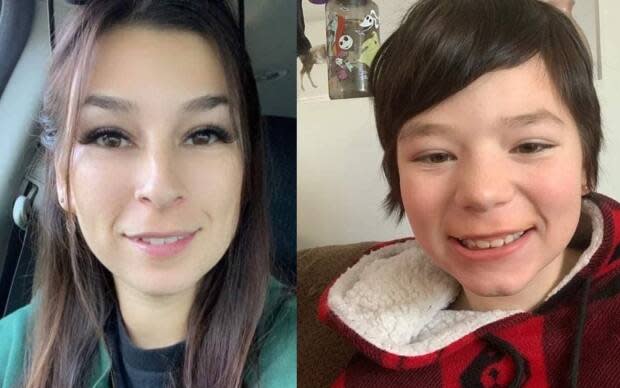In the grim aftermath of child homicide, families and first responders struggle to cope

There are no members of the Robillard family left in southeast Edmonton.
In their grief after Carolann Robillard and her 11-year-old child, Jayden Miller, were fatally stabbed in a random attack outside Crawford Plains School on May 5, 2023, surviving family members could no longer face spending their days in that part of the city.
Carolann Robillard's two surviving daughters moved out of the city. Her sister, Amanda Robillard, moved to the north side and her mother, Donna Robillard, followed.
"There was too many memories and all that," Donna Robillard said in an interview this month.
The Robillards' loss was massive and overwhelming — a violent, random homicide had claimed two family members, one of them only a child.
Jayden was one of six Edmonton children whose deaths were ruled homicides in 2023 — the highest number of child homicides the city has seen in a single year in at least a decade.
Any homicide can be devastating regardless of the victim's age, but families and first responders who grapple with children being killed face a uniquely painful situation.
Circumstances of the child deaths in Edmonton last year ranged from alleged parental infanticide to a suspected intentional gang shooting.
The victims ranged in age from five weeks to 11 years old:
Five-week-old Leviathan Puchalski was admitted to hospital on Feb. 5 and died three days later. Investigators say he died from abusive head trauma. His father, 28-year-old George Russell Hulleman, was charged with second-degree murder.
On March 7, a five-month-old baby girl was hospitalized with blunt-force trauma injuries, and died the next day. Her mother was charged with second-degree murder. A publication ban protects the identities of mother and child.
An eight-year-old girl whose identity is protected by a publication ban went missing from a west Edmonton residence in late April. Her remains were discovered days later in Maskwacis, Alta. A 27-year-old woman is charged with first-degree murder. Four other adults are facing charges in connection with her death. The girl's identity, and that of the 27-year-old woman, are protected by publication bans.
Jayden Miller, 11, was fatally stabbed outside Crawford Plains School on May 5.
An 18-month-old girl died in a home in the Lauderdale neighbourhood Aug. 16. Following an autopsy and toxicology testing completed in September, a 27-year-old woman was charged with manslaughter and criminal negligence. Police declined to name the woman or the child, citing privacy of surviving children.
Gavin Uppal, 11, and his father were shot and killed outside a gas station at 50th Street and Ellerslie Road on Nov. 9 in what police said was a gang-related shooting. No suspects have been arrested.
Though not classified as a homicide, police have also laid criminal negligence charges against three adults in the September 2023 death of a 23-month-old boy who investigators say died after ingesting amounts of several strong opioids.
The majority of homicide victims in Edmonton are adults. Few are children, according to data provided by the Edmonton Police Service (EPS).
Edmonton saw more child deaths by homicide in 2023 than in any year in previous decade
EPS keeps a close eye on officers assigned to investigate the deaths of children and teens, making sure they have the support they need, a spokesperson said in an emailed statement. Officers can seek help from an employee and family assistance program.
Insp. Colin Derksen said the homicide team has tried to come up with practical ways to offer support, such as avoiding sending detectives who have small children of their own to attend the autopsy of a child. Other investigators without young children often volunteer to go instead.
"Files involving the death of children are always especially difficult for our investigators. They see children as the 'truest of all victims' — victims who are unable to defend themselves and rely on adults to keep them safe," Derksen said in a statement.
"When they die at the hands of those who they rely on for safety and protection, it is especially heartbreaking."
Dan Jones, chair of justice studies at NorQuest College and a retired Edmonton police officer, said impacts of investigating children's deaths can linger for years.
Jones once worked on a case where two brothers, ages four and six, were killed by their father around Christmas. He sought help through therapy, but it wore on him long afterwards.
"I think it's the loss of innocence, right? I think it's the loss of hope," he said.
Even seeing any references to the animated Disney movie Cars would prompt a strong reaction because the little boys were wearing pyjamas with Cars characters on them.
"These things can trigger you. And if you don't address it and you think you're OK, it sometimes sneaks up on you a little bit later," Jones said.

Jones said officers need to take a long-term view of their own well-being, and take care of their needs before they hit a breaking point. His own experience was a "mental-health crash" that came after he retired.
He believes EPS has good initial support in place for investigators, and he's optimistic about work to introduce broader wellness strategies to help officers deal with traumatic experiences.
Years like 2023, with a high volume of child homicides, make things harder. The events can compound with other difficult cases and workplace stresses, including a perception that public criticism of police is increasing, Jones said.
Long road for families

As the initial shock wears off and time passes, many families who have lost a child or other loved one to homicide end up feeling isolated and alone, said Jane Orydzuk, president and founder of the Victims of Homicide Support Society.
The Edmonton group started meeting in 1995, several months after Orydzuk's 33-year-old son Tim Orydzuk was killed.
At first there were about seven families participating, and now the group has around 100 members, many of them referred by EPS. It's become a community where people are able to share and understand one another's loss.
Regardless of the victim's age, their loss leaves a huge gap in the family, Orydzuk says.
"When you lose a child to murder, it takes you years to not necessarily accept it, but to just absorb it. You're just in denial for so long because our kids aren't supposed to die before us," she said.

As the one-year anniversary of Jayden and Carolann's deaths approaches, Amanda Robillard said it seems like the grief will never go away.
It really helps when friends, community members and even people she's never met, but who knew her sister, offer support, she said.
"The days that I feel like I can't go on, I get that strength from just talking to someone," she said.
The family has also been struggling with frustration with the justice system.
The suspect in Carolann and Jayden's deaths was shot by police and died in hospital. But his court and parole records revealed a long and violent record, leaving the family questioning why he was on the streets and not being monitored.
To cope, the Robillards have thrown themselves into finding ways to memorialize Jayden and Carolann.
They started Jayden's Wish, a program that collects donations and distributes them to Edmonton's homeless population.
They're selling T-shirts and planning a memorial bike ride for June 15 to raise money for Carolann's surviving daughters.
They're also planning a memorial round dance at Boyle Street Plaza on May 11 to mark the one-year anniversary of the tragedy.
Donna Robillard has also found solace in participating in Murdered Missing and Indigenous Women and Girls events as May 5, the day her daughter and Jayden were killed, is the National Day for Awareness of MMIWG.
She said supporting others in loss and receiving support in return during memorial walks is meaningful to her.
"When I look up in the sky, I just go, 'We love you,'" she said.


